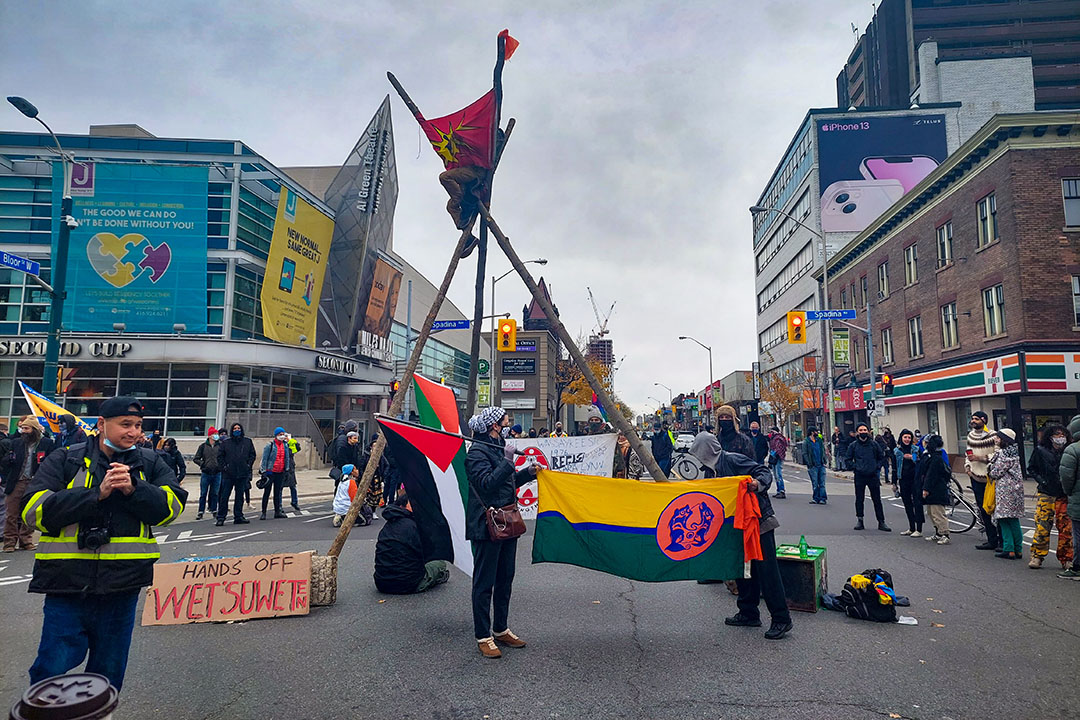On November 20, protestors blocked off the intersection of Bloor and Spadina to oppose the Coastal GasLink (CGL) pipeline slated to go through uncededed Wet’suwet’en land. The solidarity rally was a continuation of the Wet’suwet’en Nation’s years-long protest against TC Energy’s construction of a multi-billion-dollar, 670-kilometre long natural gas pipeline.
According to CTV News, Indigenous advocates emphasize that the Wet’suwet’en pipeline conflict is about more than a pipeline — it is, at its core, about Indigenous rights. “We’re supposed to have the right of saying no,” said Catherine Brooks, an Indigenous Elder who was present at the protest.
Background
The movement against the CGL pipeline has been going on for around a decade. Since December 2019, Wet’suwet’en land defenders and their allies have blockaded railways and roads in an effort to halt the pipeline project. In 2020, mass protests, sit-ins, and rail blockades across Canada erupted in solidarity with the Wet’suwet’en Nation after the Royal Canadian Mounted Police (RCMP) arrested seven people during a raid of a Unist’ot’en camp in northwestern BC.
Wet’suwet’en territory is situated around 300 kilometres west of Prince George, BC and is unceded, meaning that it is not governed by any treaties. Accordingly, the Wet’suwet’en Nation never surrendered its inherent rights to the land. Wet’suwet’en hereditary chiefs say that they did not consent to the construction of the CGL pipeline on their traditional territory.
Brooks pointed out that the Wet’suwet’en chiefs had proposed alternate routes to TC Energy, but “they simply want it their own way.”
Protestors also expressed concerns about the project’s environmental impact. The construction of the pipeline requires drilling under Wet’suwet’en sacred waters, which would pollute the Wet’suwet’en people’s drinking water source, diminish salmon populations, and threaten other vulnerable species.
Last Thursday, the RCMP arrested more than 10 people near Houston, BC, including Wet’suwet’en Elders, legal observers, and journalists. Before that point, members of the Wet’suwet’en Nation had blocked access to roads leading to the pipeline project in order to prevent pipeline workers from accessing the site.
In response to the arrests, Brooks said, “What did the RCMP do? They didn’t help people. They didn’t rescue people. Instead, they arrested Indigenous people and their supporters and allies, and they’re [still] holding them.”
She added, “That’s why we’re here — to pray, and to speak about this, and show that we do not consent to these terrible things happening on the land.”
The Spadina protest
The action event opened with speeches near U of T’s main Department of Sociology building. Following the speeches, some members of the crowd burned a shirt that said “Fuck Trudeau.” Other protestors performed a traditional Indigenous dance called a ‘jingle dress dance.’
“It’s [a dance] for healing,” explained Luma, a second-year student at U of T and one of the protestors who performed the dance, in an interview with The Varsity. She said that whenever there’s any hurt or sickness in a community, jingle dress dancers hold tobacco in their palms and perform the dance as prayer.
Once protestors had moved to the intersection, one protestor sat on top of a teepee, flying a Mohawk Warrior Society flag.
In an interview with The Varsity, protestor Drew Temple said she was at another demonstration defending Indigenous land rights — the Fairy Creek blockade on Vancouver Island — during this past summer. Temple told The Varsity that she had witnessed “tremendous racism” at Fairy Creek — specifically, “the brutal mistreatment of Indigenous and BIPOC land defenders.”
She called upon settlers and people in privileged bodies to “feel the urgency of these matters, and to do whatever they can with their lifeforce energy.” Often, she said, that means a non-Indigenous person standing in protection in front of an Indigenous person, because of the violence that Indigenous peoples and other BIPOC face at the hands of the police.
When asked what she hoped people would take away from the protest, Temple said, “We can’t wait anymore. There’s no more apathy, there’s no more feeling immobilized or frozen. We act now.”


